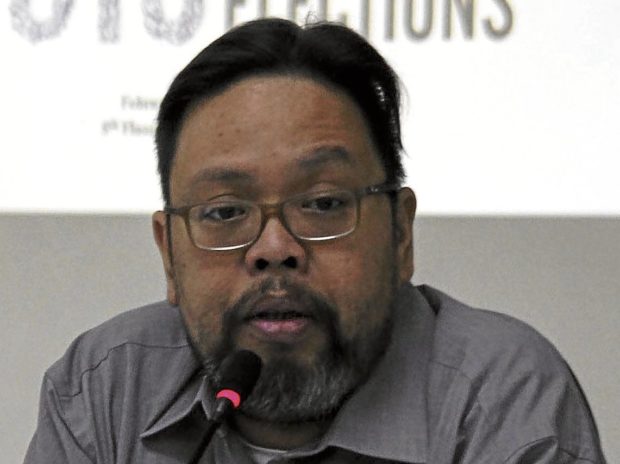Comelec raises possibility of politicians using COVID vaccines to ‘buy’ votes

Comelec spokesperson James Jimenez. (File photo from Philippine Daily Inquirer)
MANILA, Philippines — Commission on Elections (Comelec) spokesperson James Jimenez raised the possibility of politicians using COVID-19 vaccines as another form of vote-buying.
“Sigurado iyan. Sigurado may magsusubok niyan,” Jimenez said in a statement published by Participate on Friday, an election coalition affiliated to the Ateneo School of Government.
“Balita nga ngayon, mas maraming vaccine kaysa sa gusto magpa-vaccinate. Di ko alam how effective but sigurado may magsasabi niyan na ‘pag binoto niyo ko, babakunahan ko kayo.”
(That’s for sure, some politicians will try that. I’ve heard in the news that there are now more vaccines than vaccinees. I don’t know how effective but for sure, a politician will say that “if you vote for me, I will have you vaccinated.”)
Jimenez warned that the promise of providing or threatening to withhold government services is also considered a form of vote-buying.
Article continues after this advertisement“Iyan ang sinasabi ko na pangako ng impluwensiya. Pangako ng serbisyo ng gobyerno na iwi-withhold o ibibigay depende kung sino ang nag-aalok. Kasama sa vote buying ‘yan,” he went on.
Article continues after this advertisement(That’s why I call it a promise of influence. The promise of the government service to provide or withhold depending on those who offer it. That is considered vote-buying.)
He also said that vote buyer could also use e-wallets as a means of distribution.
“Mas madali ngayon vote buying dahil sa e-payments or mobile payment system. Dahil mas madali vote buying, napakadali rin mismo na maganyak ang mga tao na mag-engage in vote buying,” Jimenez pointed out.
(Vote buying is now made easier due to e-payments or mobile payment systems. Because of easier ways for vote-buying, it is easier to encourage people to do it.)
“Pangalawa, mga kandidato, mahihirapan mangampanya. May matatakot na baka kailangan dagdagan chance ng pagkapanalo, magre-resort sila sa vote buying,” Jimenez added.
(Second, the candidates will have a hard time campaigning, there are fears that they need to increase their chances of winning, so they will resort to vote-buying.)
Previously, Comelec Commissioner Rowena Guanzon, said they are eyeing to seek the assistance of Bangko Sentral ng Pilipinas to trace such activities.
Jimenez, meanwhile, revealed that back in 2019 elections, politicians bought votes for P20 up to P50,000. He also said that politicians also used the conditional cash transfer program, better known as 4Ps, for vote buying, in the previous elections.
RELATED STORIES:
Vote buying still an offense, Comelec spokesperson insists